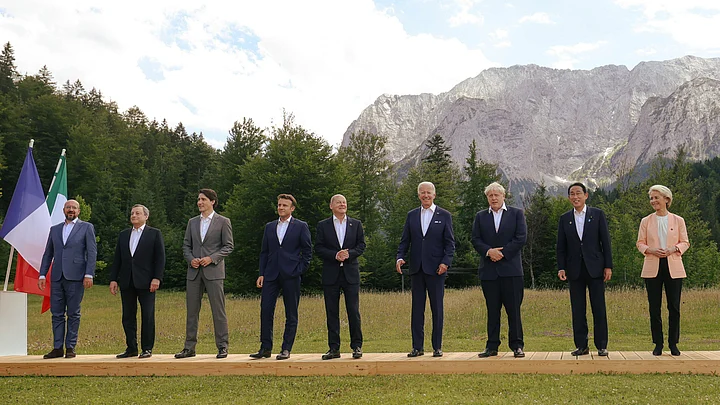As leaders of the G7 met in Bavaria, Germany, on Sunday, 26 June, one of the items on the agenda was a proposal to cap the price of Russian oil and pipeline gas to sanction the Kremlin for its assault on Ukraine.
While Russian oil production has reduced due to sanctions, the revenue per barrel has spiked due to high global prices, which, as of 24 June, is $107.62 per barrel.
"Putting a ceiling on the price of fossil fuels imported from Russia has a geopolitical goal as well as an economic and social one," Italian Prime Minister Mario Draghi said on the first day of the three-day meeting.
"We need to reduce our funding to Russia. And we need to eliminate one of the main causes of inflation," he added.
Draghi, along with US Treasury secretary Janet Yellen, are the strongest proponents of this move, and has gained support from French President Emmanuel Macron.
The G7 summit is taking place as Russian missiles rain down on the Ukrainian capital, Kyiv.
Ukrainian president Volodymyr Zelenskyy will deliver a video address to the G7 on Monday, most likely requesting more heavy weapons and artillery.
G7 Bans Russian Gold Imports
The G7 leaders announced on Sunday that their countries will ban gold exports from Russia, which are a major revenue source for President Vladimir Putin''s government.
In US President Joe Biden's words, gold export "rakes in tens of billions of dollars for Russia."
The official announcement regarding the same will happen on Tuesday, 28 June.
Last year alone, Russian gold exports were worth $15.45 billion, and wealthy Russians abroad have been purchasing gold to limit the damaging effects of western sanctions.
Prime Minister Boris Johnson of the UK said that the move "will directly hit Russian oligarchs and strike at the heart of Putin’s war machine."
"We need to starve the Putin regime of its funding," he added.
Russia Defaults on Foreign Debt
The effects of western sanctions on Russia were on display on Sunday as it defaulted on its foreign debt for the first time since the Bolshevik revolution of 1917.
According to a Bloomberg report published on Monday morning, Russia missed a deadline to meet a grace period of 30 days on interest payments of $100 million on two Eurobonds.
These payments were originally due on 27 June.
Dennis Hranitzky, an expert at a law firm called Quinn Emanuel, told Reuters, "Since March we thought that a Russian default is probably inevitable, and the question was just when."
Russian debt in foreign bonds amounts up to $40 billion. The problem is that much of its foreign currency and gold reserves are now frozen due to sanctions.
But how much does it really matter?
When a country defaults on foreign debt, it can be barred from engaing with the bond-market. So it can't borrow until the default has been fixed. Investors also need to have confidence in the government’s ability to pay back the loan.
Given that Russia's access to the western markets, due to western sanctions, been restricted, there is no question of Russian borrowing in the present or the near future anyway.
Unlike the late 1990s, when Russia defaulted on domestic debt, the US is unlikely to step in even to save the global financial and banking system.
(With inputs from The Guardian, Reuters, and Bloomberg.)
